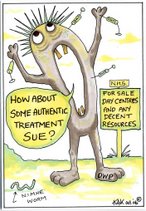It is terribly moving to watch people in a deep rescuing feeling-therapy re-connect the thunderous but desperate voice of war trauma or rape, or early childhood abandonment, for these themes join together and show a core human need for protection . Its a protection that disappeared for them and life is left naked to be ravaged in one way or another. That life cries on the edge of its felt-death and re-experience of a kind of destruction - its like watching a small planet end. Even in an observer its rips away with its raw winds of human truth .
And yet there is a moving great integrity in these connections . Courage and humanity enough to move a God .. History claiming itself back to the core of a living document of soul that truly belongs with us all - not in some special existential or chemical zone of incarceration ...
It also shows up a previously terrible and effective barrier for the person to get well from emotionally traumatic events and that is the powerful reflexive action by the brain to partly split from events . To dissociate .
There is no doubt that our cultures constantly recruit this feature of dissociation and partly do so perversely as a functional virtue, yet when this socially functional virtue-reservoir is full up enough of internal pain and trauma, then it spills forever and creates its host of internally dislocated and weird effects - here comes "madness" and a crippled internal life unless a way is found to drain it and not "chain it"...
At UserWatch we will speak up for that kind of therapeutic travel for time and time again we have found UK NHS services and certainly in post industrial Birmingham UK dealing with people labelled as Borderline Personality Disorder and various forms of psychosis and severe neuroses and other hells in the experience of the human continuum as though these things are not socially and familially connected. They are .
Our culture is still afraid and controlling, and disconnects the partly disconnected all over again to keep them disconnected and it does not allow them the grace of their terrible story and the grace of socially borne full witness. Connection and re-connection over time makes the self slowly create a home in itself . But others too can make healing faster if they can admit the sorrows of the facts of trauma .
Yes, connection and re-connection and the growth of the emotional-Self to tolerate itself and its memories and feelings and yet feel its core of humanity is not merely a "personal experience "- it can be a socially allowed one too - that is always part of the problem - that the self is always set inside the emotional prohibitions of culture and family .. And often permanently chained there.
That is where the primary mental health stigma still is, in the emotional underbelly of our cultures :
The Taboo against feeling pain and connecting it and witnessing it into slow growth - into real human stories ..
And with that witness a new critique of who we are and where we are and why we war and rape and abandon the weak begins...Its a hope perhaps that we will all slowly walk as a culture one day towards rescuing human pain with fuller witness and not psychiatric and chemical services that often keep history so completely chained and away from real human languages ..
Today is a day when UserWatch puts a story here below about war and sexual trauma and its effects but we could be just as easily writing and echoing and showing other writers stories about family trauma , child abuse, and the mechanisms that keep people mad and crazed for years ....We all keep each other mad until we find mechanisms of joined up emotional acceptance of feelings and experiences and making languages around it all for as long as it takes to make some collective sanity ..
-----------------------------------------------------------------------------------------------
Study found 1 in 7 from Iraq, Afghanistan who sought medical care were victims
By Randy Dotinga
HealthDay Reporter
TUESDAY, Oct. 28 (HealthDay News) -- Shedding light on the challenges facing women in the military, a new study shows that more than one in seven female Iraq and Afghanistan veterans seeking VA medical care reported experiencing sexual trauma during their service.
Posted October 28, 2008Veterans who reported sexual trauma, such as rape and threatening sexual harassment, were three times more likely to be diagnosed with a mental illness such as depression or post-traumatic stress disorder.
"These mental health conditions are getting recognized, diagnosed and treated," said study co-author Joanne Pavao, a researcher with the VA Palo Alto Health Care System's National Center for Post-Traumatic Stress Disorder, in California.
Pavao and her colleagues analyzed the records of 89,960 Iraq and Afghanistan veterans who sought medical care in the VA health-care system between Oct. 1, 2001, and Oct. 1, 2006. They were expected to present their findings Tuesday in San Diego at the American Public Health Association's annual meeting.
A total of 1,849 women -- 14.5 percent -- reported experiencing sexual trauma during their service; 471 men -- 0.6 percent -- said they'd experienced sexual trauma.
A study released in 2007 found that 22 percent of female veterans and 1 percent of male veterans reported sexual trauma in VA health-care surveys conducted in 2003. That study looked at veterans of all types, not just from Afghanistan and Iraq.
The new study found that these men and women were three times more likely to be diagnosed with a mental illness than those who didn't report experiencing sexual trauma.
Among women who reported experiencing sexual trauma, 76 percent were diagnosed with a mental condition, compared to 47 percent of other female veterans. The rates were similar in men.
According to the study, the most common mental health conditions among the Iraq and Afghanistan veterans were depression, post-traumatic stress disorder, anxiety disorders, adjustment disorders (which cause stress and other problems during certain situations), and drug addiction or alcoholism. All were more common in men and women who reported sexual trauma; post-traumatic stress disorder was much more common in women than men in that group.
It's not clear where the sexual trauma occurred. "It's sexual trauma that occurred during active military duty," Pavao said. "It could have occurred at any point during the service history of these men and women."
All veterans who seek health care within the VA system are screened for sexual trauma, Pavao said. "When this is detected, they're offered free health care for all conditions that the clinicians determine to be related to military sexual trauma. This is part of the VA's large-scale efforts to treat these conditions in a timely way."
If they get treatment, many women who experienced sexual trauma can recover, said Edna B. Foa, a professor of psychology and psychiatry at the University of Pennsylvania who studies sexual violence.
About 20 percent of women who are raped in the general population develop post-traumatic stress disorder, she said. "Even if they don't meet the criteria of the disorder, many of them will have symptoms that will cause them distress, difficulties having sexual relationships, etc....," she said. "Having a sexual trauma is serious."
More information
Learn more about sexual trauma in the military from the VA. "

















.jpg)






